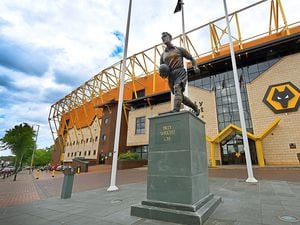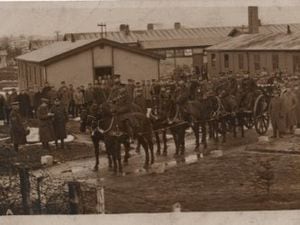How pioneering gardener Percy Thrower helped shape Shrewsbury
A gardener who became a household name? That would be Percy Thrower, who was a pioneer of a whole new genre – the TV gardener.
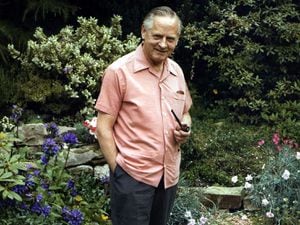
Of course, calling him a gardener is a massive simplification of what he actually did. As Shrewsbury's parks superintendent, he shaped Shropshire's county town beautifully, and colourfully.
He played a part in improving international post-war relations. He was a largely unheralded saviour of Shrewsbury Flower Show when it ran into serious trouble. He was a pin-up pipe smoker, if there can be such a thing. And he got shot. Yes, really.
And we shouldn't omit to mention that he got a Blue Peter badge.
When the press referred to him, they called him things like "Britain's Mr Gardening" or "Britain's Head Gardener."
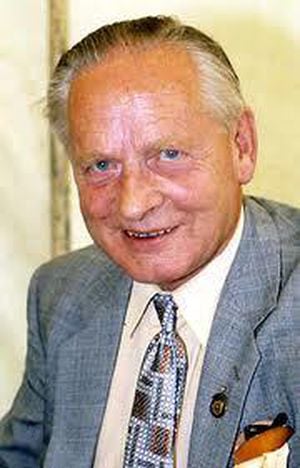
It was not just what Percy did directly. He inspired people and gave them the know-how – and the plants, through his well-known garden centre at Shrewsbury – to make their gardens more beautiful.
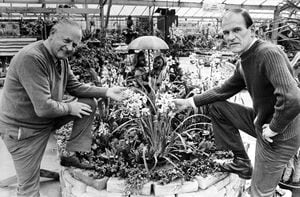
As the nation's highest profile gardening expert he, more than anyone else, helped to turn amateur gardening into an amazing multimillion pound business.
Even in the early days of black and white television (when viewers only had his word for the colours of the blooms) he was spurring an army of enthusiasts to dash out in search of new trees, shrubs, and plants.
During his long involvement with radio and television, which spanned almost 40 years, Percy became the friend of royalty, the aristocracy, film stars – and especially the ordinary man or woman in the garden.
He was a sociable man, who liked entertaining and chatting to people, and with his avuncular manner, trademark pipe, and down-to-earth advice, he was a natural on screen and over the airwaves.
"I have been a very lucky chap really, to come from that little estate in Buckinghamshire and end up with my life,'' he once told an interviewer.
It was in about 1946 that Percy got his broadcasting break when BBC horticultural adviser Godfrey Baseley put his name forward for a 10-minute spot on a radio programme called Country Calendar.
His first TV appearance was in 1951 and five years later the BBC's Gardening Club programme began.
His influence spanned the generations, reaching youngsters as resident gardener for 14 years on BBC's Blue Peter children's programme, where he designed the original Blue Peter Garden at the Television Centre in London.
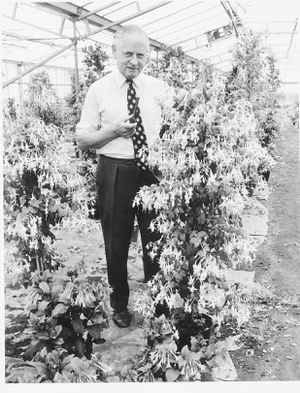
His arrival in Shropshire came when took up his job as Shrewsbury's parks superintendent on New Year's Day, 1946.
Although relatively young at 32, he had already chalked up much experience and could boast an impeccable pedigree.
He was chosen from no fewer than 72 applicants following the resignation the previous November of his predecessor Mr G S Ingle, whom Percy will have known well, as they had worked together at Leeds in 1934.
Percy's arrival made the Shrewsbury Chronicle, who described him as "energetic."
"A married man with an 18 months old son (sic – actually, a daughter), Mr Thrower, although young, has had considerable experience, and holds a much coveted National Diploma of Horticulture, issued by the Royal Horticultural Society," it told readers.
Percy had begun his career in 1927 under his father, who was head gardener at Horwood House, a large estate in Buckinghamshire.
His first job was to prepare flowers for the dining room and filling leather buckets with fresh hay, a traditional technique for absorbing tobacco and cooking smells.
Two years later his father sent him to be a "bothy boy" – a young gardener living in the garden in special lodgings – at the Royal Gardens at Windsor, where for five years he served under Charles Cook, head gardener to the King, working 11 hours a day for a shilling (5p) a week.
It was to change his life. Not only did young Percy learn about growing exotic plants, but as well as learning a great deal from Mr Cook he fell in love with his daughter Connie.
This set Percy apart from the other lads, for the young gardeners were hardly allowed to look at the great Mr Cook, never mind court his pretty daughter.
Although he left in 1934 to take up parks work at Leeds, he continued to court Connie and married her in 1939 at Sandringham, where Mr Cook was now Queen Mary's gardener.
Until the day he died Percy still had the wedding present from the Queen, a set of Burslem china dishes.
He came to his new role in Shropshire from Derby, where he had been assistant parks superintendent. One surprising role had been cultivating bananas during the war at Darley Abbey Park.
Derby was famous for its chrysanthemum show and Percy was a member of the committee.
The Chronicle reported: "He is a member of the Institute of Park Administration, a Fellow of the Royal Horticultural Society, and holds a number of other certificates granted by this body.
"He also holds a Royal Horticultural Society certificate for extensive lecturing on food production during the war, and was lecturer in horticulture at Derby Technical College."
Born to Norfolk parents, Percy was actually a native of Buckinghamshire.
He told the Chronicle reporter that he was greatly looking forward to Shrewsbury's first post-war Flower Show, and was anxious to get on with the task of the reconstruction of The Quarry in Shrewsbury, to make it even better than before the war.
The Quarry was at a low ebb, having understandably being neglected during the conflict, and the general parks had been used for "Dig For Victory."
One of his first tasks was overseeing the controversial felling of the lime trees in The Quarry, which had become old and potentially dangerous – indeed, a child had been killed by a falling tree some years before.
Percy set out to impress. He found 50 old fuchsias in the greenhouses and got them going quickly and took cuttings, new cuttings from the tips of the first rootings and then he rooted the side shoots.
"By planting out time I had more than 5,000 fuchsia plants and they made a wonderful display for a very low cost,'' he was to recall.
This display of hundreds of thousands of little bells made two great impressions – a radio commentator talked to Percy about them, and the famous gardener was to be linked forever with fuchsias. His prize-winning displays at Shrewsbury Flower Show were to become world famous.
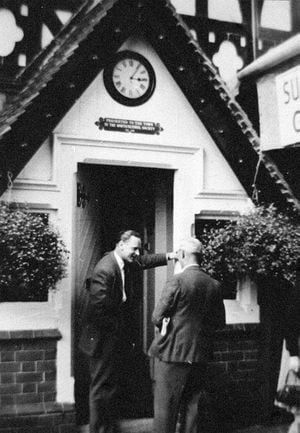
Percy's first appearance on the radio was competent and the BBC were so impressed that they included him in the regular radio programmes that were to follow, Round and About and Beyond the Back Door.
The arrival of television was to become the real breakthrough for Percy.
"Those early days of television were very exciting. We were breaking into new ground and there was a wonderful feeling of achievement about the programmes.''
He was writing prolifically, too. His first column was in the Express & Star and thousands of magazine articles were to follow, along with more than two million book sales.
In the 1960s he built a bungalow at Bomere Heath, five miles out of Shrewsbury, which became a mecca for garden lovers and which was much-filmed for the Gardeners' World BBC television programme. One effect of the advent of colour television had been that studio gardens no longer looked credible.
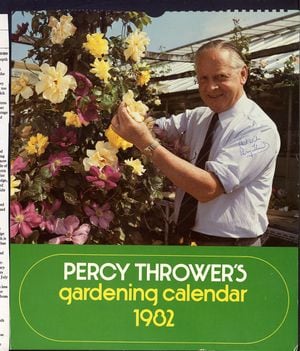
He opened a huge garden centre on the A5 bypass around Shrewsbury and enjoyed his life in business. But commercialism and the BBC are always strange bedfellows and in the early 1970s it was to lead to a crisis.
Percy – one of the most famous men of television – was sacked by the BBC. He had been appearing in advertisements on independent television and he was dropped from the programme he had made so great.
"Mr Greenfingers pruned by the BBC," "Percy gets the Big Welly Boot,'' and "Percy's in the Fertiliser," screamed the headlines.
However other doors opened and fortune smiled on him again. He had a lucrative deal with ICI, did programmes for the other channel, did more writing, lecturing and enjoyed his trips around the world with the Percy Thrower travel company.

He was feted wherever he went and received the highest awards possible from many societies, including the august Royal Horticultural Society, being awarded the society's Victoria Medal of Honour in 1974.
But he was more touched by a special programme than by anything else when he appeared on This is Your Life. The famous – including the late Lady Isobel Barnett, Mai Zettering and Arthur Billitt of Clacks Farm – turned up to pay tribute to him.
Percy, who even made an appearance on Morecambe & Wise, won his way back into favour with the BBC and his death in 1988 came just a few days after he retired as the gardener for Blue Peter.
He retired as Shrewsbury's parks superintendent in 1974. In The Quarry, The Dingle, with its lake and beautiful sunken garden, is often referred to as his masterpiece – although The Dingle had been laid out long before his arrival, he made various alterations and improvements.
His name was synonymous with Shrewsbury Flower Show. Not only was he one of the leading organisers, but he won the supreme award five consecutive times from 1979 to 1983.
He was horticultural adviser to show organisers Shropshire Horticultural Society for over 40 years and then its chairman.
The flower show of August 1970 was disastrous, being hit by its worst weather for 50 years, with continual rain. It plunged the event into a financial crisis and its future was in serious doubt.
It survived because Percy stuck his neck out financially to prop it up. Percy, on the horticultural side of the show, and Doug Whittingham, on the financial side, stood as financial guarantors, acting as security for the show. It meant that if the next show had not been a success, they faced bankruptcy.
Happily in 1971 the show returned to profit and it went on to flourish.
Another lesser-well known aspect of Percy's work was his role as Shropshire held out the hand of friendship to the German people following the Second World War, helping to create an "English Garden" in the divided capital of Berlin, which lay in ruins.
The English Garden, sometimes called the English Peace Garden, was made in the Tiergarten area using trees, shrubs and other plants generously given by Salopians.
Percy was a central figure in the project, and around the spring of 1951 travelled to the city to design and develop the garden on behalf of Shropshire Horticultural Society, which remains there still, used and enjoyed by a modern generation of Berliners.
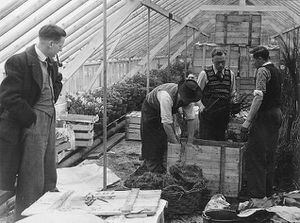
For many years Percy's trademark was his pipe, and he once won the Pipesmoker of the Year Award, but he finally gave up the habit in early 1985 after a heart attack.
As for that shooting... that was in November 1980, when Percy was accidentally shot in the face during a pheasant shoot at Eyton, near Wellington. He was taken to hospital with pellet wounds, but was not seriously hurt – luckily most of the shot was deflected by the barrels of his own gun, which took the brunt of the blast.
Percy took eight pellets in the face, five in his right hand, and two in the left.
The accident happened around the time of the "Who Shot J.R.?" riddle on the contemporary television drama Dallas, but unlike in that, the person who shot "P.T." was never identified publicly.
In 1984 he was awarded the MBE.
Percy never fully recovered from a heart bypass operation in 1987 and died in 1988, aged 75.
Flags of the Borough of Shrewsbury flew at half mast as the town mourned.


